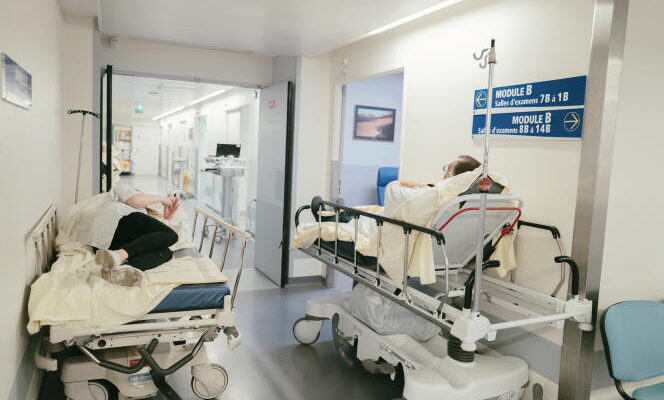In May 2022, the warning cry caused a reaction. Even before the summer, 120 emergency services, or nearly one in six, were operating in a degraded manner and were subject to closures, primarily at night and on weekends, a union of emergency physicians had warned. This was followed by the launch of a “flash mission” by the President of the Republic and a pack of 41 measures deployed by the government in the summer of 2022.
A year later, emergency physicians no longer bother to count. Nor the beaded closures of emergency services for lack of doctors, which are shelled each week in the pages of the local press, in Langon (Gironde), Pontivy (Morbihan), La Ferté-Bernard (Sarthe), Château-du-Loir ( Sarthe), Puy-en-Velay… Nor the patients on stretchers in the corridors. Neither the deaths “unexpected” in waiting conditions deemed unworthy, which they tried to take into account this winter to alert people to the situation. “We are dying in silence”we hear in the mouths of professionals, who have gone from anger to a form of resignation.
Emmanuel Macron, however, put the subject back on the table, during his speech on April 17, promising to “unclog” emergencies by the end of 2024. But the President of the Republic’s announcement raised little hope. “For a year, the situation has only worsened, closures have become chronic throughout the territory, and it is the patient who pays the pricesays Doctor Marc Noizet, head of the SAMU-Urgences de France union. We already know that the summer is going to be much worse than the previous one. »
For the chief of the emergencies of Mulhouse, “there is no miracle solution, but you have to muster up your courage and stop letting things deteriorate in silence”. In other words, make a choice: either finally launch a plan that restores “outlook” to caregivers, or “arbitrate” by assuming to close a number of these services whose promise is to remain open twenty-four hours a day.
“Feeling fed up”
There is no “dry closure” of emergency services, we say in the office of the Minister of Health, François Braun, where we only speak of “input regulation”, without reporting stronger than usual alerts. It’s a “long-term work”do we defend ourselves by putting forward all the measures “structural” being deployed to better orient upstream of emergencies towards city medicine, up to the “smooth patient pathways” once in the emergency room, thanks to the development of “bed management” units at the territorial level to find them a bed, or even to upgrading measures to restore the attractiveness of the hospital for caregivers .
You have 66.17% of this article left to read. The following is for subscribers only.
